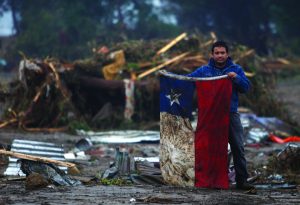Following the massive earthquake that struck the small and poverty-stricken country of Haiti on Jan. 12, 2010, countless people worldwide were shocked by the pictures and news of destruction, death, and losses. Many felt that this would be the natural disaster of 2010: much like the tsunami of 2004 and Hurricane Katrina in 2005. Sadly, this perception was changed earlier this week as another natural disaster struck.

Saturday, Feb. 27, the fifth largest earthquake in recorded history struck Chile, the long and narrow country on the western boarder of South America. Unlike Haiti, the country of Chile is considered to be one of the most prosperous and stable on the South American continent. Lasting nearly 3 minutes, the earthquake registered on the Richter scale as an 8.8 and included approximately 90 large aftershocks. Some aftershocks, as well as the initial rumblings, were felt as far as Brazil (a country that sits nearly 1,800 miles away). News of the earthquake quickly spread around the globe as countries, including the United States, rushed to begin sending aid.
Due to the structure of the country of Chile, the incredibly large quake was substantially less damaging than the smaller 7.1 earthquake that struck the island of Haiti. After an earthquake in 1985, Chile began to restructure its building codes to create more stable structures. Buildings which had once been considered “dangerous” were remodeled to support earthquake conditions and multiple areas of the country were reinforced with strong concrete to resist plate movement. Also, unlike the island of Haiti, the earthquake occurred nearly 22 miles below the surface and over 70 miles from the nearest urban center. This allowed the quake to “fizzle” as it moved towards the surface and had minimal impact on the most populous areas.
Never-the-less, this earthquake was devastating to the people of Chile. The city of Concepcion, the 11th largest in the country, was hit heavily by the 8.8 earthquake. While search and rescue missions are currently underway, President Michelle Bachelet has reported over 708 deaths. With a large amount of people still considered missing, rescuers fear the death toll will only continue to rise. In an interview, Bachelet commented, “We see this as a catastrophe of unspeakable magnitude. It will take a massive effort for recovery.”
President Michelle Bachelet is working quickly to stop the looting problem, one that devastated the country of Haiti immediately following the earthquake earlier this year. In hopes to curb the need to loot, Bachelet is opening all supermarkets for necessary items (food, water, and basic essentials) without charge. Chilean soldiers are filling the streets, enforcing a curfew policy from dawn to dusk. Although the country initially denied the offer of international aid, the slowly deteriorating conditions have brought aid to the country from the United States and political figures, including Hilary Clinton.
The earthquake in Chile quickly caused additional problems worldwide as aftershocks created a potential for tsunamis throughout the Pacific. The island of Hawaii was evacuated of nearly 100,000 people and the country of Japan prepared its coastal cities for the worst. While the evacuation plans may have been slightly premature, the precautions were necessary and overall successful. Swells never rose over 5 feet and death tolls directly related to the tsunami remained low.
The country of Chile will have a direct affect on economic business as rescue missions continue. Chile is very well known for its copper mines and deposits: a necessary source of funding for many corporations and industries worldwide. The copper mines have officially been closed for an undetermined amount of time, a change that will create monetary problems worldwide.
Overall, while the damage in Chile has not begun to rival that of Haiti, the destruction and losses will remain parallel. Many wonder whether this is the last earthquake we will see in 2010 and whether the countless amounts of aid being given to these countries can truly help in rebuilding. Much like Haiti, a texting-based charity method has been set up for the country of Chile. Continue to check news websites for detailed information about the earthquake destruction in Chile.







